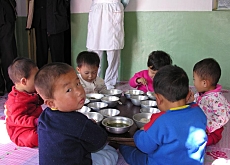NGOs ready to leave North Korea

Swiss NGOs are preparing to hand over to the North Korean government to comply with an order to leave the country by the end of the year.
Their aid and development projects, which have benefited many thousands of North Koreans, fell victim to a ban on humanitarian aid announced in August.
The communist regime told agencies that humanitarian assistance had to stop by the end of the year and that expatriate staff must leave.
In principle the idea was to end food aid and switch to development aid instead, but in practice non-governmental organisations running development projects were also asked to leave.
One of the three Swiss organisations active in North Korea is the Adventist Development and Relief Agency (ADRA). The organisation has had a presence in the country since 1999 and now has six projects up and running.
ADRA’s office is Swiss-run in collaboration with North Korean staff, supplied by the government. The funding comes from ADRA branches all over the world.
“We took all the necessary steps to see if we could stay but unfortunately it was not possible. Our wish is that we can return in the future to continue to pursue our activities in North Korea,” Alexander Gasser of ADRA Switzerland told swissinfo.
Good harvest
With a population of 22 million, North Korea has relied on foreign assistance since natural disasters and mismanagement caused its economy to collapse in the mid-1990s.
This year’s good harvest and bilateral aid arrangements with South Korea, encouraged the isolated regime to opt for self-sufficiency in 2006.
Since 1992, the ADRA bakery in the capital Pyongyang has been producing vitamin-enriched bread rolls for kindergarten children to enhance their diet.
The bakery also produces wholemeal biscuits for 32,000 children in the north of the country. It will hopefully continue to operate under central government management, Gasser said.
“It is our philosophy that the projects we set up are passed on to local hands at a certain point. We just had to do it more quickly than planned,” Gasser explained.
A World Food Programme survey carried out in October 2004 found that 37 per cent of young children were chronically malnourished, and one third of mothers were malnourished and anaemic.
UN resolution
The political context has an impact on relations with aid organisations. In November, a United Nations General Assembly committee passed a resolution expressing serious concern about alleged human rights violations in North Korea.
The assembly’s social and humanitarian committee backed a European Union-sponsored document, citing reports of “widespread and grave” abuses. It urged Pyongyang to “fully respect all human rights”.
The resolution also urged the government to allow further humanitarian aid, permit NGOs to continue their work and give them access to the whole country.
This link between human rights and greater access to the country angered the regime and North Korea’s position has hardened since then.
Talks that had been underway between NGOs and the regime to phase out aid more gradually came to nothing.
Poor diet
The Swiss Agency for Development and Cooperation (SDC) has been in North Korea since 1996, starting with a programme of humanitarian aid, mostly food aid.
From 2000 onwards the SDC gradually shifted from food aid to training and capacity development. As a government agency, its activities will not be particularly affected by the ban.
Ulrich Stürzinger, the SDC official with special responsibility for North Korea, said the agency had done its best to defend the work of the NGOs.
“We clearly expressed our regrets about them having to leave and explained that they were doing development work but there was still no way to change this decision,” he said.
Stürzinger still has some concerns about malnutrition and food distribution. “Although the rice allocation per person has almost doubled, the diet is still not as balanced as it should be.”
“Many NGOs were distributing food to vulnerable groups, for example people living in institutions like orphanages. It remains an open question whether these social institutions will receive the special attention they need.”
ADRA Switzerland supports development cooperation projects and provides humanitarian help in disaster areas. It is a non-governmental, independent humanitarian agency of the Seventh-day Adventist church.
Campus for Christ / Agape International is the second main Swiss NGO specialising in agriculture and milk processing in North Korea. It has played an important role in developing the national goat herd in the country, which only has 20 per cent arable land.
The Salvation Army also finances projects in North Korea but does not have a permanent mission there.

In compliance with the JTI standards
More: SWI swissinfo.ch certified by the Journalism Trust Initiative











You can find an overview of ongoing debates with our journalists here . Please join us!
If you want to start a conversation about a topic raised in this article or want to report factual errors, email us at english@swissinfo.ch.